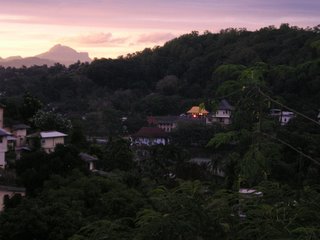The Abhidhamma

One of my good friends Elizabeth has lived alone for years while moving from city to city. When I asked her how she always seemed to get a great social life going wherever she went, she told me to never turn down an invitation to anything. No matter if she thinks it sounds stupid, or even if she doesn’t like the person, she might meet someone else interesting. Prior to moving to Sri Lanka I had lived in Charlottesville, Virginia, for 10 years. I sat back and let the social life come to me. If I just returned emails and phone calls I had more than enough on my dance card. Once I got to Sri Lanka I remembered Elizabeth’s words. “It’s easy to just sit around your house in your sweats. Sometimes when someone calls, I don’t feel like going out. But I tell myself that if I go and don’t like it, I can leave. About 80% of the time I end up having a good time.”
One of Dan’s friends gave me the number of a British woman, Kathleen, a trailing spouse whose husband works for one of the NGO’s on the tea plantations. I went ahead and called her, introducing myself. We talked briefly and exchanged basic information. A few weeks later she called me back and invited me to dinner with her and her cousin Kristeen, another British woman in town for three months helping a Kandy NGO write a new business plan. I felt nervous about going out alone after dark to a new place. It would have been really easy to curl up in my sarong and watch American TV on DVD’s, but I remembered Elizabeth’s words and agreed to the dinner. I had Kathleen give directions to Dan over the phone since I was not familiar with her part of town. That night Dan called our usual driver, Manju, and gave him the directions in Sinhala. He told me later that he also told Manju to me careful with me, “she is my treasure.” It was practically the first time I had ever been in a three-wheeler alone.
Dinner turned out to be really fun and Dan and I have both been invited to a large lunch Kathleen is throwing this weekend. Kathleen also recommended her yoga teacher, Janaka, to me. “He’s very good, it’s like an hour of Kristeen and I screaming in pain, my housekeeper doesn’t know what to think” she told me laughing.
“Yes, he’s married to an English woman too, so he’s got a good cultural understanding,” Kristeen added. He sounded perfect to me, and I felt especially secure knowing that he was used to working with Western women. I took his card and called to arrange a time for the next week. On the phone he started to give me directions and I stopped him, “my driver doesn’t speak English,” I explained. “I’ll call tomorrow and you can explain to him.” Since Dan was back at the Panagoda base for the week I had to call my driver on my own to come over. I identified myself to him by saying “hello, this is the white lady,” in Sinhala. Once my other driver, Manju’s brother Kapila, came to the house I called Janaka to give directions to my driver in Sinhala.
Everything went smoothly and the yoga session was amazing. I have a strong practice on my own, but it is good to have a teacher to shake you out of the rut of poses you like to avoid. I learned some new tips on alignment and even learned a new yoga party-trick to impress the folks back home. While I was waiting for Kapila to return to pick me up, Janaka mentioned that on Wednesday night he and a friend were going to lead an Abhidhamma discussion the next night and invited me to attend. I had no idea what the Abhidhamma was, but I recognized the word “Dhamma” in there and remembered Elizabeth’s mantra, “Accept any invitation.”
“Ok,” I agreed, “but can you please give my driver directions before we leave so that I can get there?” I asked, feeling very clever that I had this thought out in advance. Janaka agreed and came up to the road when Kapila arrived. They began extensive discussion in Sinhala centered on Janaka drawing a map in the dirt of the road with his toe and adding progressively more and more detail. Once Kapila felt secure that he knew where we were going the next evening, he took one of Janaka’s cards and we left.
When Dan called to check in that night I told him that the yoga session had gone well and I was going to go to an Abhidhamma discussion the next night. He immediately started laughing.
“What?” I demanded, “What is the Adhidhamma anyway?”
“Well, you’ll see,” he told me, refusing to offer any more information.
“Well look,” I said defensively, “Even if it’s lame, I might meet some other people there to hang-out with.”
“Yeah, maybe it won’t be so bad,” Dan agreed disingenuously, I could almost hear him smirking. “Call me when you get home.”
Kapila arrived at the appointed time and took me straight to the house in one of the Kandy suburbs only asking for directions once. When I arrived at the house I immediately saw a white woman with a substantial un-repaired cleft palate, who I took to be Jananka’s wife, Billy. I introduced myself, trying not to stare at the cleft in her lip as she spoke with the typical muffled cleft-palate voice. I had only seen one other example of such a strong cleft palate without repair. In both my previous acquaintance and the woman before me, the deformity seemed to define the entire jaw and lower face with a narrowing of the teeth and jaw. As I studied her she continued to talk and led me inside. “Ranyan has quite a lot of experience in meditation and Abhidhamma,” she explained Janaka’s co-teacher to me. “He lived for years in America, and, um, now he’s back,” she finished brightly. Billy began introducing me to various children, two of hers about 4 and 7, and “we’ve got another on the way,” she commented, patting her just visible stomach happily. She also introduced me to Ranyan’s daughter, who looked about 12. Looking at Billy’s strawberry blonde hair and freckled face, and then back at her children who looked purely Sri Lankan, I contemplated how strange it must be for one’s children not to resemble one’s self at all.
After Billy left to organize the children I was left to move around the small house on my own. I gradually figured out that Ranyan had returned to Sri Lanka from America with his daughter to live with his mother. The old woman floated around the house, herding the three children I had met plus others into a side room. I could tell it was the old woman’s house. There was a huge Buddha shrine, an upright piano, an old family picture, and overstuffed tapestry pattern furniture. I saw no evidence of anyone who had been to America, let alone lived there. Wandering into the main room I sat down next to the only other participant, a Sri Lankan woman on one of the couches. I was opening my notebook as Ranyan walked into the room. He was wearing a special outfit of black linen shirt and pants with an enlongated white Chinese character set on the left chest. He took a seat at the front of the room next to a small dry-erase board. He looked different than most Sri Lankan men, who tend to be very lean. Even though he wasn’t fat per se, he had a slightly over-stuffed chipmunk look to his face. Jananka followed him, wearing a white shirt with a black appliqué dragon and a white longi. I almost failed to recognize him since he had shaved his thick hair from the day before, like a monk.
“Well,” Janaka began as Billy sat down on the floor and Ranyan began to study a book in Sinhala, “This is the first night we are doing this. Each lesson will build on the next one.”
“We are going to give you five questions that you are not going to be able to answer now, you will eventually” Ranyan began, “you aren’t meant to understand now,” he assured us, as he and Janaka exchanged a pleased look with each other. Ranyan then began to translate the five questions from some sort of Sinhala lesson book; it was obvious that he had no preparation whatsoever. I suspect that he was translating out of classical Sinhala, which is difficult for even the native speaker to bring into English. With difficulty he put forth the following five questions:
What are the four ultimate realities?
In which way is consciousness divided?
What is the sense sphere?
What are the five material sphere consciousnesses?
What is the super-mundane consciousness?
I realized that I had stumbled into the inaugural meeting of a Buddhist Adult Bible Study group. With frequent references to the Sinhala book Ranyan began to outline the Adhidamma’s structure and it’s place in the Pali Cannon of Buddhist works. The Adbidhamma is the third Pitika, or “basket” of the Pali Cannon. The first group is the teaching of the Buddha, the second is the rules for monks, and the Adhidhamma is an elaborate classification system that makes up the third. He continued translating from the book and when he paused for a long period of time, Janaka would fill in with some color commentary. Janaka never looked at a book; instead he told stories about flying Arhats and personal examples to illustrate points.
The lesson went basically as follows: within the Mundane Sphere exist 81 spheres divided up into 54 Sense Spheres, 15 Fine Material Spheres, and 12 Immaterial Spheres. Within the Sense Sphere there are 12 unwholesome modes, 18 rootless modes, and 24 beautiful modes. Within the unwholesome there are 8 kinds of greed, 2 types of hatred, and 2 types of confusion. Janaka encouraged us to look within ourselves and those around us for these roots of thought an action. Ranyan went on to explain that “all love is really a form of greed. All love, love of family, everything.” Janaka nodded his head in approval in full view of his pregnant wife. Both men had children in the room next door but exchanged pleased self-satisfied looks. “And that is why Buddhism is supposed to be taught by monks,” I could hear Dan saying in my head. I focused back on Janaka’s shaved head, wondering if he wanted to look and feel like a monk instead of the reality of his status as a young lay householder.
When I got home I called Dan when I was settled into bed. “Well, I learned a lot, just not what they wanted me to learn,” I told him. “I feel sad for myself that I cannot accept the religion of my host culture, Christianity. I don’t know if it is some sort of need to be different or what, but even as a young child in Sunday School it just never rang true for me. There are these guys with their Abhidhamma and then the old women you see doing puja at the bo tree and neither one of them relates at all to what I thought Buddhism was or what I want it to be,” I continued, referring to the rituals with milk and oil that people perform at sacred Bodhi trees for good fortune. “I mean, maybe if I was receiving this teaching from the Buddha himself, or maybe even a bodhisattva, maybe then it would be palatable,” I ranted on.
“What you have to understand about the Abhidamma is that it’s a systematization of everything to help Buddhist monks argue with that nasty Brahmin priest down the road or just with each other.” Dan replied. “These’re not the teachings of the Buddha; they’re by monks for monks so that everything is laid out. This stuff is really dry. I would never teach it, maybe to a few really enthusiastic upper level grad students, but really, there’s no point. You put it in the hands of some middle class Sri Lankans and they just want to feel clever talking about it. I’ve only known one teacher who could really bring it to life,” he explained.
“That makes sense,” I replied, calmer now. “I’ve heard you say that sort of thing before, but now it all comes together.”
“Alright, I’ve had a long day at the base. I’m sorry you had a boring night, but I’ll be home tomorrow and we can go over it some more if you want,” Dan replied, sensing that I was more relaxed.
“I’m tired too,” I replied, and we said our goodnights.












